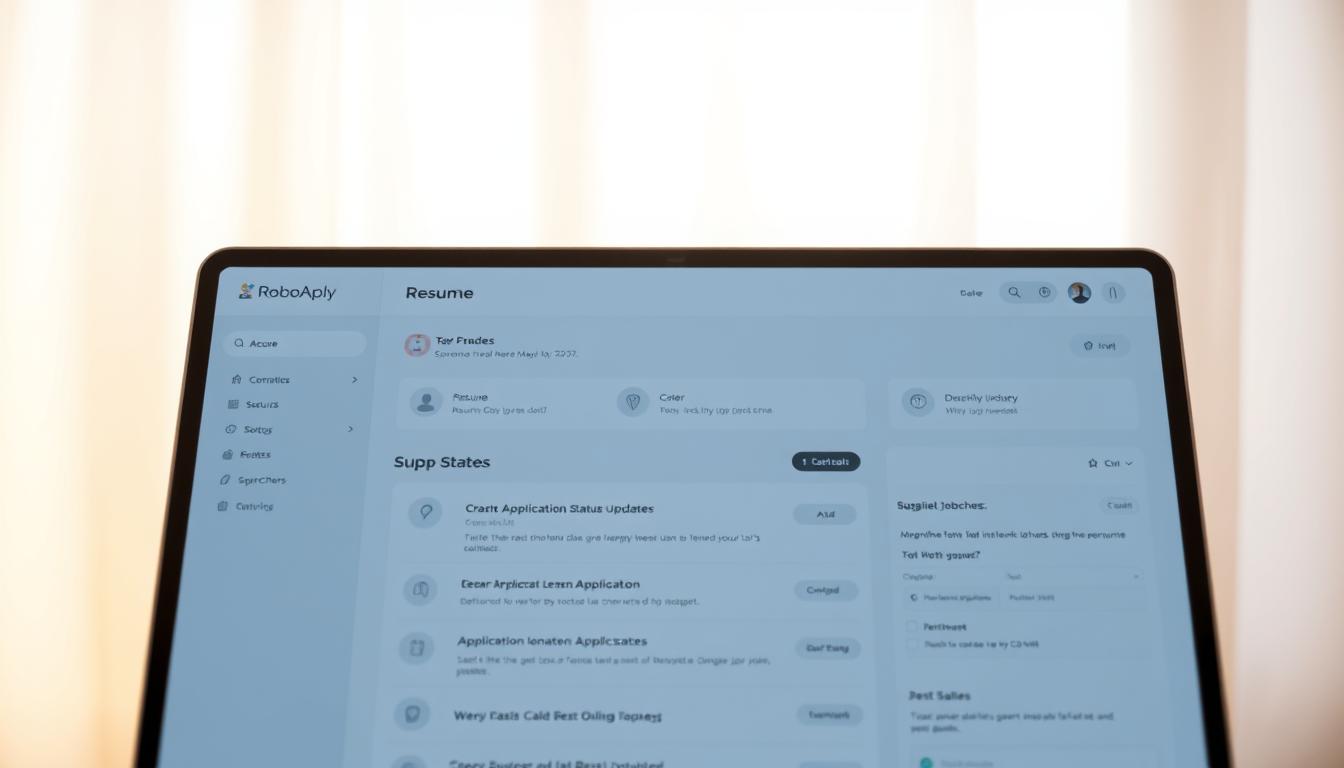Did you know that 75% of hiring managers miss out on qualified candidates? This is because old application methods get in the way. Today’s job market is tough, and you need more than just a resume.
You need strong digital tools to stand out. The right app can turn your job search into an efficient, automated system. This system can really help you find a job.
RoboApply is leading this change with AI tools. It makes your job search easier by building smart resumes and sending them out. It tackles all the challenges of finding a job today.
This guide shows you the best ways to find a job using digital tools. You’ll learn how to get interviews and find your next job with confidence.
Key Takeaways
- AI-powered platforms like RoboApply automate time-consuming application tasks
- Modern tools optimize resumes for Applicant Tracking Systems (ATS)
- Automated submission features save hours while increasing application volume
- Built-in analytics track your progress and identify improvement opportunities
- Interview preparation tools boost confidence and performance
- Integration with major employment platforms streamlines your workflow
Understanding Job Search Apps and Their Benefits
Today’s job search is all about digital tools. They make applying for jobs easier and reach more people. These tools have changed how we look for jobs by bringing all opportunities together and doing tasks for us. Let’s explore how these tools work and why they’re key for job seekers today.
What Are Job Search Apps?
Job search apps are platforms for mobile and web that gather job listings from many places. They connect to employer sites and job boards. This way, they show you jobs that fit your skills and goals.
These apps offer personalized experiences based on your career path. They act as your digital career helper, organizing jobs and tracking your progress.
They also have social features for networking with recruiters and professionals. This makes them great tools for managing your career.
How Job Search Apps Work
These apps use smart algorithms to find jobs for you. When you sign up, they match your skills and interests with job openings.
They use AI to compare your qualifications with job descriptions. Advanced platforms like RoboApply even create resumes for you in minutes, based on your goals.
They also have systems to apply to many jobs at once. This saves you time and lets you apply to more jobs.
Advantages of Using Job Search Apps
The main advantage is saving time with automated searches and tracking. You can find thousands of jobs in one place, not just on company websites.
These apps also give you access to jobs not found elsewhere. Many employers post jobs here first, giving you a head start.
They offer features like:
- Real-time application status monitoring
- Salary insights and company reviews
- Networking opportunities with industry professionals
- Resume optimization suggestions
- Interview preparation resources
They also provide analytics to see which applications get responses. This helps you improve your job search strategy.
The convenience of these apps is huge. You can search, apply, and talk to employers from anywhere. This makes your job search more flexible and quick to respond to new opportunities.
Top Job Search Apps for Job Seekers
Using the right digital tools can greatly improve your job search. The best job seekers use many platforms to find jobs and apply easily. These three apps are key for a strong job search optimization strategy.
RoboApply
RoboApply changes how you apply for jobs with smart automation and AI. It works with LinkedIn, indeed, and ZipRecruiter to make applying easy with just one click.
This tool helps you build resumes, write cover letters, and send applications quickly. You can apply to many jobs in minutes, keeping your applications professional. RoboApply’s AI tailors your materials to each job.
It saves you lots of time and ensures your applications are always good. You don’t need to switch between sites or fill out long forms.

LinkedIn is your go-to for networking and career growth. It lets you show off your skills, connect with others, and find jobs not listed elsewhere.
It’s more than just applying for jobs. You can follow companies, join discussions, and get to know hiring managers. Being active on LinkedIn helps you get noticed.
Premium features give you better search tools, direct messaging, and insights on who’s viewed your profile. These tools offer valuable job search advice based on your online presence.
indeed
indeed is the biggest job aggregator, pulling listings from thousands of sources. It ensures you see job opportunities across various industries and levels.
Its search lets you filter by location, salary, company size, and job type. You can get job alerts and recruiters can find you through its resume database.
It also has company reviews and salary info to help you choose jobs wisely. The mobile app lets you search and apply anywhere, keeping your job search moving.
Glassdoor
Glassdoor gives you inside info on companies, salaries, and work culture. This helps you avoid bad jobs and negotiate better pay.
Employee reviews give real insights into management, work-life balance, and career growth. Salary data helps you know what to expect for your role. Interview reviews help you prepare for company interviews.
The job search on Glassdoor is linked to its company info. You can research employers while looking at job listings. This is smart job search optimization that goes beyond just applying.
Specialized Job Search Apps for Specific Industries
Specialized job search apps help you find niche jobs in your field. They know your skills and career goals. They offer targeted job postings that fit your expertise.
Using these apps with AI tools can boost your job search. RoboApply’s AI makes your resume stand out. It highlights your strengths for each job.
Tech and IT Jobs
Tech jobs need platforms that get coding and tech skills. Stack Overflow Jobs connects you with jobs that match your programming skills. You can show off your coding skills on Stack Overflow.
AngelList is for startup jobs. You can join new companies and get equity. It focuses on company culture and mission.
Dice has tech jobs for all levels. You can filter by programming languages and salary. It gives tips on technical interviews and building a portfolio.
To find tech jobs, make profiles on all three platforms. Use RoboApply’s AI for cover letters. Set up alerts for your preferred technologies and update your profiles often.
Healthcare Jobs
Healthcare jobs need platforms that understand medical skills. Health eCareers has jobs in all healthcare areas. It checks employer credentials and provides facility info.
NurseJobs has nursing jobs at all levels. You can search by specialty and shift. It has tools for comparing salaries and benefits.
Doximity is for physicians. It’s a network and job board. It verifies professionals to ensure credibility.
For healthcare jobs, keep certifications current and highlight patient care. Use RoboApply’s AI for cover letters. Emphasize patient outcomes and satisfaction.
Remote Work Opportunities
Remote jobs need different skills than office jobs. Remote.co offers real remote jobs in various fields. It checks employers to avoid scams.
We Work Remotely has many remote job listings worldwide. It categorizes jobs by time zone and collaboration needs.
FlexJobs offers remote and flexible jobs. It has career coaching and skill assessments. It gives tips for remote work success.
Remote job applications need to show self-management and communication skills. RoboApply’s resume optimizer highlights these skills.
Show you can work well alone but also connect with teams. Mention successful remote projects and digital communication skills. Time management skills and results are key for remote jobs.
Specialized platforms help you find jobs that match your skills. You’ll face less competition. Use these platforms with AI for better application success.
How to Optimize Your Profile on Job Search Apps
Getting noticed in job searches often depends on your profile’s quality. Your profile is your digital first impression. Recruiters glance at each application for just seconds. Effective job search means treating your profile as a marketing tool to show your worth.
Optimizing your profile is more than just uploading a resume. You must know how applicant tracking systems work and what keywords recruiters look for. The best job seekers follow job search best practices to stand out across many platforms.

Crafting an Eye-Catching Resume
Your resume is the core of your job search app profile. RoboApply’s AI resume builder creates professional, keyword-rich content quickly. It makes resume creation easy and ensures your resume meets current standards.
Begin with a compelling professional summary that showcases your achievements. Use specific numbers and metrics. Instead of saying “managed a team,” say “managed a team of 12 sales representatives, increasing quarterly revenue by 35%.”
The platform’s grammar checker makes sure your resume is error-free. The ATS optimizer ensures your resume passes through applicant tracking systems. These tools help create documents that both humans and machines can easily read.
- Use action verbs to start each bullet point
- Include relevant certifications and technical skills
- Tailor your experience section to match target job requirements
- Keep formatting clean and professional
- Limit your resume to two pages maximum
Choosing the Right Keywords
Choosing the right keywords is key to being found by recruiters. Analyze job descriptions in your field to find common terms. RoboApply’s AI analysis finds the most impactful phrases for your career goals.
Focus on hard skills, soft skills, and industry-specific terms. Hard skills are technical abilities like “Python programming” or “financial modeling.” Soft skills include leadership, communication, and problem-solving. Industry terms might be “HIPAA compliance” for healthcare or “Agile methodology” for tech roles.
Use keywords naturally in your profile. Avoid keyword stuffing, which can make your content hard to read and trigger spam filters. Instead, blend relevant terms into your job descriptions, skills sections, and professional summary.
- Research 10-15 job postings in your target role
- Create a list of frequently mentioned skills and qualifications
- Prioritize keywords based on your actual experience
- Test different keyword combinations using RoboApply’s analyzer
- Update your keyword strategy monthly based on market trends
Setting Job Alerts Effectively
Setting up job alerts saves time and ensures you don’t miss out on opportunities. Create specific search criteria that match your skills and goals. Avoid broad parameters that lead to irrelevant notifications and waste your time.
Set up multiple alerts with different criteria. One alert might focus on your exact job title, while another searches for related roles in your industry. Include location preferences, salary ranges, and company size requirements to filter results effectively.
RoboApply’s resume score analyzer gives instant feedback on your resume’s performance against ATS systems and recruiter criteria. Use this tool to improve your application materials based on real-time feedback and industry standards.
Review and adjust your alerts weekly. The job market changes fast, and new opportunities emerge all the time. Update your search terms based on trending skills in your field and emerging job titles that match your experience.
- Create 3-5 different alert combinations
- Set realistic salary and location parameters
- Include both exact job titles and related terms
- Schedule alerts for optimal timing (early morning or evening)
- Monitor alert performance and adjust criteria monthly
Keep your information consistent across all platforms. Discrepancies between your LinkedIn profile and resume can raise red flags with recruiters. Regular updates show you’re actively engaged in your career.
Tips for Using Job Search Apps Effectively
To get the most out of job search apps, plan your strategy and stick to daily habits. This turns casual browsing into a path to career growth. The key difference between those who succeed and those who don’t is their approach to job search strategies and how they execute them.
Use a mix of technology and personal networking to build a strong job search system. Modern apps have great tools, but how you use them matters a lot.
Daily Job Search Routines
Creating daily routines is key to successful job search techniques. Set aside specific times each day for job searching, not just random browsing.
Begin your day with 30 minutes reviewing new job listings. Aim for a certain number of applications each week to keep up the pace without getting overwhelmed. Consistency beats intensity in job searching.
RoboApply’s job tracker helps you keep track of your progress. Set weekly goals and see how you’re doing across different platforms. This approach helps you meet targets and find the best job search platforms for your field.
Plan your day with specific times for applying, updating profiles, and networking. This keeps your focus sharp and your efforts quality.
Networking Through Apps
Networking through job apps means more than just making connections. Engage deeply with industry pros by commenting on posts and sharing valuable insights.
Focus on quality over quantity in networking. Thoughtful comments on posts from your target companies or industry leaders show your expertise. It also keeps you on the radar of potential employers.
RoboApply’s outreach CRM makes networking easier by managing your relationships. It helps you track interactions, plan follow-ups, and keep records of your networking efforts.
Use these job search strategies to build real connections that go beyond just job opportunities. Many jobs are found through referrals, making networking essential.
Utilizing Company Reviews
Researching companies through reviews gives you valuable insights. This improves your application success and interview skills. It’s important to understand a company’s culture, pay, and interview process before applying.
Glassdoor and similar sites offer employee reviews that reveal a company’s culture, management, and growth chances. This information helps you tailor your applications and prepare for interviews.
Look at salary ranges and benefits when researching companies. This information strengthens your negotiation position and helps you decide if the opportunity fits your career and financial goals.
Focus on patterns in employee feedback rather than individual reviews. Reviews that mention the same issues or benefits are more reliable than isolated comments.
| Review Platform | Best For | Key Features | User Base |
|---|---|---|---|
| Glassdoor | Salary research and company culture | Anonymous reviews, salary data, interview questions | 59 million users |
| indeed Company Pages | Recent employee feedback | Integrated with job listings, photo galleries | 250 million users |
| LinkedIn Company Pages | Professional insights and employee connections | Employee posts, company updates, insider connections | 900 million users |
| Comparably | Workplace culture and diversity data | Culture scores, CEO ratings, diversity metrics | 15 million users |
Effective job search techniques treat job searching as a professional activity. Set measurable goals and stick to a routine. Use automated tools and personal networking for a well-rounded approach.
Combining daily routines, strategic networking, and thorough company research leads to better job opportunities. This method is more effective than applying randomly.
Remember, job searching takes patience and persistence. Your daily efforts add up, leading to the right opportunity. Stay consistent and refine your approach based on results and feedback.
The Role of Social Media in Job Searching
Using social media is key in your job search. It helps you be seen by more people and connect with others in your field. Social media turns passive job searching into active career building by helping you engage and build your brand.
Today, job searching is about using many platforms. This mix of automation and real connections helps you show your skills and find jobs not listed on usual boards.
LinkedIn vs. Other Platforms
LinkedIn is the top site for professional networking. It has a job board and tools for recruiters. Your LinkedIn profile is like your digital business card for employers.
RoboApply’s Chrome extension makes applying to jobs on LinkedIn easier. It lets you apply to many jobs quickly while still being personal.
Twitter and Facebook are good for networking too. They let you show your personality and join in on industry talks. LinkedIn is for serious professional connections, but these sites are for more casual chats.
Twitter is for sharing quick thoughts and joining in on big conversations. LinkedIn is for sharing professional updates and insights.
Building Your Brand on Twitter
Twitter is where you show you know your stuff in your field. Share your thoughts on trends, articles, and talk to leaders in your field.
Using Twitter to show your expertise is smart job search advice. Share your work, talk about industry news, and join in on hashtag chats to get noticed.
To grow on Twitter, be regular and real. Talk about what matters to your future employers and really talk to others’ posts. Stay away from topics that might upset people.
Your Twitter bio should clearly say what you do and what you want to do. Use keywords that recruiters might use to find you. This makes you easier to find for the right jobs.
Engaging in Professional Groups on Facebook
Facebook groups are great for networking in specific areas or industries. They help you meet peers, share experiences, and find jobs through community involvement.
Find groups for your industry, local areas, and career-focused topics. Being active in these groups shows you’re serious about growing professionally and can help you meet future colleagues and bosses.
Instead of just promoting yourself, share useful content in these groups. Help others by answering questions, sharing job search tips, and talking about industry trends.
Many jobs are shared in these groups before they’re public. Members often post about jobs at their companies or know about them through their networks. This can really help your job search.
Keep your professional image the same on all social media. Your profiles should tell a story about your career and what you’re aiming for. The secret is to mix automated tools with real connections that show who you are and what you value to employers and industry folks.
The Future of Job Search Apps
Technology is changing how we look for jobs, making the search smarter and faster. The job world is moving fast, with AI and machine learning changing how companies find workers. Knowing these trends can help you stand out in your job search guidance.
Today’s job search apps are getting better, offering more than just matching keywords. They aim to give you a more personalized job hunt experience.

Innovations in Job Matching Algorithms
New algorithms are changing how jobs find you. They look at your career path, skills, and cultural fit to suggest jobs that match you. This is different from old keyword searches.
Machine learning looks at patterns in job success. It learns from millions of hiring decisions to find jobs that fit your background and goals. This makes your job search more personalized and effective.
These systems also consider timing and market trends. They can tell when companies are hiring and suggest the best times to apply.
The Rise of AI in Recruitment
AI is changing recruitment, from making applications to scheduling interviews. Tools like RoboApply use AI for resume and cover letter creation. They make your application materials fit the job perfectly.
AI can analyze job descriptions and create responses quickly. This helps you keep your applications consistent while addressing each employer’s needs. You’ll get more responses and interviews.
These tools also give feedback on your applications. They suggest improvements based on successful applications in your field. This helps you get better with each application.
Trends to Watch in 2024
Several trends are shaping the future of job searching. Staying updated will help your job search guidance. Video interviews are becoming common, with AI screening candidates. You’ll need to prepare for digital interviews.
Skills-based matching is becoming more important. Employers want to see what you can do, not just your qualifications. This opens doors for career changers and self-taught professionals.
Predictive analytics help you find the best times to apply. They analyze hiring patterns to suggest when you should apply for the best chance of success.
| Technology Trend | Impact on Job Seekers | Implementation Timeline | Preparation Required |
|---|---|---|---|
| AI Resume Optimization | Automated personalization for each application | Currently Available | Learn AI-powered platforms |
| Video Interview Screening | Initial screening through AI video analysis | Widespread by 2024 | Practice digital interview skills |
| Skills-Based Matching | Opportunities beyond traditional qualifications | Accelerating Now | Document and showcase practical skills |
| Predictive Application Timing | Optimal submission windows for higher success | Emerging in 2024 | Monitor market trends and hiring cycles |
The future is for those who blend AI efficiency with personal branding. While AI handles the tech, your unique personality and professional network are key.
Adapting to these technologies while keeping human connections will put you ahead. The goal is to use innovative job search technology to enhance your personal touch.
Success in the changing job market means being adaptable and always learning. Keep up with new tools and platforms. But remember, technology should support your efforts in building relationships and growing professionally.
Common Mistakes to Avoid When Using Job Search Apps
Even the best job search apps can’t fix basic mistakes job seekers make. These errors can ruin your chances and limit what you can do with job search tools. Knowing these mistakes helps you improve your job search skills.
Every application should be a thoughtful effort, not just a quick send. The best candidates avoid common mistakes. They focus on quality and use technology to reach more people.

Ignoring Job Descriptions
Applications that ignore job descriptions are often ignored by employers. By not reading job descriptions, you miss important keywords and qualifications. This shows you didn’t take the time to understand the job.
RoboApply’s AI helps match your resume and cover letter to each job. It finds key words and qualifications, making your application stand out. This targeted approach boosts your chances of getting noticed.
Failing to Network
Only applying online can miss out on many job opportunities. Many jobs are filled through internal networks and referrals. Not building professional relationships limits your chances.
Use RoboApply’s tools and also network through professional platforms and events. Networking is as important as applying. Avoiding common mistakes means keeping up with networking efforts.
Not Following Up on Applications
Not following up on applications shows you’re not interested. Many candidates wait too long for responses. This makes you less visible and shows you’re not really interested in the job.
RoboApply’s job tracker and CRM help you stay on top of follow-ups. This ensures you don’t miss any opportunities. Professional follow-through makes you stand out from other candidates.
By avoiding these mistakes and using technology wisely, you can improve your job search. Success comes from focusing on quality and using tools to enhance your approach.
Success Stories: Real Users Who Landed Jobs
These inspiring stories show how technology and job search strategies can change careers. People from different fields used advanced tools and plans to get great jobs. Their stories show how planning and the right tools can help you succeed in your career.
The following case studies show how job search techniques led to success. You’ll learn tips to help you advance in your career.
A Tech Professional's Journey
Sarah Martinez, a software developer, changed her career path with a smart job search plan. She used RoboApply’s AI resume builder and LinkedIn to get interviews in six weeks.
Her plan had three main parts. First, she made her resume ATS-friendly with RoboApply’s help. The AI found key terms that hiring managers looked for.
Second, Sarah kept her personal brand real while using automation. She made cover letters with RoboApply, then added personal touches. This made her stand out.
“The mix of AI and networking boosted my confidence. I knew my resume was top-notch, so I focused on building employer connections.”
Sarah’s success is clear. She got 12 interview offers and landed a senior developer job with a 40% pay raise. Her story shows how job search strategies can blend tech and human touch.
The automation let Sarah keep applying while preparing for interviews and networking. This balanced her time well.
A Healthcare Specialist's Experience
Dr. Michael Chen moved from clinical work to healthcare administration with the right tools. He faced the challenge of showing his skills in new roles.
Michael used RoboApply to highlight his experience. The AI helped him explain how his clinical skills fit administrative roles. This was key for non-clinical jobs.
He used several job search techniques wisely. Michael researched companies, tailored applications, and tracked his progress. Automation helped with the routine tasks, letting him focus on networking.
His efforts paid off. In eight weeks, he got three final interviews and a healthcare operations manager job. The new role offered better balance and a 25% pay raise.
Michael’s story shows the value of persistence and planning. As this job hunting guide points out, staying committed and adaptable is key, even for those over 45.
Both stories show the power of tech and planning in job hunting. They prove that the right tools and strategies can lead to success in various industries.
These success stories offer key lessons for your job search. Focus on ATS-friendly materials, use automation to keep applying, and spend time on networking and interviews. This balanced approach can help you find your dream job.
Conclusion: Making the Most of Job Search Apps
Your success with job search apps depends on using them as professional tools. They need strategic use and consistent effort. Platforms like Job Bank’s mobile app offer customizable searches and real-time alerts to stay ahead.
The Importance of Persistence
Persistence is key in today’s competitive job market. Keep active on various platforms and let RoboApply handle routine applications. This lets you focus on networking and targeted outreach.
Set daily goals for applications and stick to your schedule. This approach helps you stay on track.
Continuing Education and Skill Development
Your skills are what make you marketable. Use RoboApply’s interview coaching tools to improve your skills. Stay updated with industry trends and certifications.
Employers look for candidates who keep learning and adapting. Show them you’re committed to growing in your field.
Planning Your Job Search Strategy
For effective job search optimization, set clear goals and track your progress. Use dashboards to see how you’re doing and adjust your strategy as needed. Aim for specific numbers in applications, interviews, and networking.
This methodical approach gives you a competitive edge. By combining technology with strategic planning, you’ll find better opportunities faster. Treat your job search as a professional project with clear goals and consistent action.
FAQ
What are job search apps and how do they differ from traditional job hunting methods?
Job search apps are mobile and web platforms that gather job listings from various sources. They let you search, apply, and track jobs from one place. Unlike old ways, these apps connect to employer sites and recruitment platforms to show jobs that fit your criteria.
They save time with automated searches and let you track applications easily. You also get access to jobs not found elsewhere. Modern apps use AI to match your skills with jobs, helping you find the right ones quickly.
Which job search apps should I prioritize for the best results?
Focus on three key apps for all industries. RoboApply is your main tool, offering AI features like resume building and automated application submissions. LinkedIn is your networking hub for showcasing your experience and connecting with professionals.
Use LinkedIn’s features to build personal connections. The largest job aggregator, indeed, pulls listings from thousands of company sites. Glassdoor gives insights and salary info. For the best results, use these apps together, combining RoboApply’s automation with LinkedIn’s networking.
How can I optimize my profile on job search apps to attract recruiter attention?
Start with a catchy resume using RoboApply’s AI builder. It creates professional, keyword-rich content in minutes. The platform’s grammar checker and ATS optimizer ensure your resume is perfect.
Choose the right keywords by analyzing job descriptions. Set job alerts with specific criteria that match your skills. Update your profiles often and keep information consistent. Use RoboApply’s resume score analyzer to improve your materials based on feedback.
What are the best job search strategies for remote work opportunities?
For remote jobs, use platforms like Remote.co, We Work Remotely, and FlexJobs. RoboApply’s resume optimizer highlights your remote work skills. These platforms offer job postings that match your remote expertise.
Use AI customization to stand out among candidates. Combine these platforms with RoboApply’s automation for consistent quality. Highlight your communication and time management skills in your applications.
How should I establish effective daily job search routines using apps?
Dedicate time to job search activities. Use RoboApply’s job tracker to monitor your progress. Network through apps and manage professional relationships with RoboApply’s CRM.
Research employers on Glassdoor before applying. Treat job searching as a professional activity with measurable goals. Consistent execution and strategic relationship building lead to comprehensive results.
What role does social media play in modern job search techniques?
Social media is key in modern job search, beyond traditional methods. LinkedIn is a top platform for professional networking and job boards. RoboApply’s Chrome extension automates your application process on LinkedIn.
Twitter helps build thought leadership by sharing content and engaging with leaders. Facebook’s professional groups offer networking chances in specific industries. Keep your professional branding consistent across platforms.
What are the most common mistakes to avoid when using job search apps?
Avoid ignoring job descriptions and generic applications. RoboApply’s AI ensures your resume and cover letter match each job perfectly. Don’t neglect networking and following up on applications.
Each application should be a strategic investment, requiring research and customization. Focus on quality over quantity.
How are AI and machine learning changing job search optimization?
AI and machine learning are transforming job search with advanced matching algorithms. RoboApply uses intelligent systems for personalized resumes and cover letters. Video interviewing, skills-based matching, and predictive analytics are key trends.
Embrace these technologies while keeping human elements that make you unique. This combination maximizes job search effectiveness.
What specialized job search apps work best for tech and IT positions?
For tech and IT, focus on platforms like Stack Overflow Jobs, AngelList, and Dice. Use RoboApply’s AI to customize your applications for technical roles. These platforms offer job postings that match your technical skills.
Maximize success by combining these platforms with RoboApply’s automation. This allows consistent application quality while targeting niche tech opportunities.
How can I track my job search progress and measure success using apps?
Use RoboApply’s dashboard to monitor application metrics and response rates. Set clear goals and adjust your strategy based on feedback and market responses. Use the job tracker to meet weekly targets while maintaining quality.
Plan your job search with defined objectives and measurable outcomes. The combination of technology and strategic planning leads to better opportunities and faster results.


















